Liberals survive again .. and the summer holidays are coming soon
Jun 15th, 2005 | By Counterweights Editors | Category: Ottawa Scene OTTAWA. Wednesday, June 15, 2005. 2:00 AM. Paul Martin’s Liberal minority government has now survived “16 confidence votes” in a marathon late-night parliamentary session Tuesday. You might almost think the MPs were trying to show how they sometimes do have to work very late. But they were also just rushing to finish up for the summer holidays. There was one “closely contested confidence vote over budgetary policies,” in which the same so-called unholy alliance of Conservatives and Bloc Quebecois as on May 19 faced off against the Liberals and New Democrats, with the (now four) independents adding the final spice. This time “the government squeaked by with 153 votes for and 149 against.”
OTTAWA. Wednesday, June 15, 2005. 2:00 AM. Paul Martin’s Liberal minority government has now survived “16 confidence votes” in a marathon late-night parliamentary session Tuesday. You might almost think the MPs were trying to show how they sometimes do have to work very late. But they were also just rushing to finish up for the summer holidays. There was one “closely contested confidence vote over budgetary policies,” in which the same so-called unholy alliance of Conservatives and Bloc Quebecois as on May 19 faced off against the Liberals and New Democrats, with the (now four) independents adding the final spice. This time “the government squeaked by with 153 votes for and 149 against.”
On other votes the unholy alliance partners went their separate ways. The “first vote on which the government could fall” passed 20696, when the BQ joined the NDP in supporting the government. In a later crucial confidence test on the government’s main or original budget Bill C-43, the Tories joined the NDP in supporting the Liberals, and the bill passed 24953.
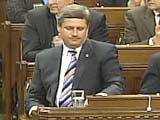 The more controversial budget Bill C-48 – which implements the deal that the Martin government made with the NDP, to avoid an early election – remains to be dealt with, before the summer recess begins late next week. But the scene last night does seem to confirm that the Conservatives have now pretty much lost all their earlier zest for bringing down the government and precipitating a fresh election. (And no doubt wisely enough, given the latest polls.)
The more controversial budget Bill C-48 – which implements the deal that the Martin government made with the NDP, to avoid an early election – remains to be dealt with, before the summer recess begins late next week. But the scene last night does seem to confirm that the Conservatives have now pretty much lost all their earlier zest for bringing down the government and precipitating a fresh election. (And no doubt wisely enough, given the latest polls.)
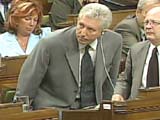 Gilles Duceppe, in his Monday explanation of why he won’t be contesting the provincial Parti Quebecois leadership, has also made clear that he sees the next federal election coming early in 2006. The Conservatives had three MPs missing from the House on Tuesday night, and the Bloc had one. Similarly casual attitudes to getting your people out for crucial votes could get even Bill C-48 through the parliamentary machinery easily enough over the next several days.
Gilles Duceppe, in his Monday explanation of why he won’t be contesting the provincial Parti Quebecois leadership, has also made clear that he sees the next federal election coming early in 2006. The Conservatives had three MPs missing from the House on Tuesday night, and the Bloc had one. Similarly casual attitudes to getting your people out for crucial votes could get even Bill C-48 through the parliamentary machinery easily enough over the next several days.
Almost the only MP who still seems a bit seriously interested in bringing the government down is Pat O’Brien, who recently left the Liberals to sit as an independent, over his opposition to the government’s gay marriage Bill C-38. The conventional wisdom still seems to be that the Liberal Cabinet would like to get this controversial legislation through before the summer recess as well. But CTV News is also reporting some “speculation that the government could instead delay a vote on that bill until the fall – in order to avoid defeat on money votes by the hands of MPs who are strongly opposed to same-sex marriage.”
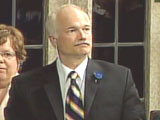 In any case the good old summertime is now in clear sight. There have been enough surprises in the past few months of Canadian federal politics to make almost any prediction about anything unusually risky at the moment. But it now seems likely enough that the Liberal minority government will make it to the summer recess that starts late next week intact. Which is a remarkable enough thing, considering how the universe looked at, say, the start of May.
In any case the good old summertime is now in clear sight. There have been enough surprises in the past few months of Canadian federal politics to make almost any prediction about anything unusually risky at the moment. But it now seems likely enough that the Liberal minority government will make it to the summer recess that starts late next week intact. Which is a remarkable enough thing, considering how the universe looked at, say, the start of May.
In any event as Conservative MP Monte Solberg alluded to the TV cameras on Tuesday, almost everyone in Parliament is now a bit burnt-out, and needs to re-charge. (And that probably goes for those of us who have just been watching it all on TV as well.)
 So if Canadian federal politics finally can make it through the next eight days without exploding in any too new directions, we will soon all be able to sit back over the lazy, hazy days of summer, and try to figure out just what has really been going on. And then sometime in the cold and sober vastness of the Canadian winter there finally will be another federal election. And the people of Canada will be able to pass another definitive judgment on just what their rulers have done, and have not done, or ought not to have done. Or something like that. It is no doubt democracy in action, here in the most northern part of North America itself.
So if Canadian federal politics finally can make it through the next eight days without exploding in any too new directions, we will soon all be able to sit back over the lazy, hazy days of summer, and try to figure out just what has really been going on. And then sometime in the cold and sober vastness of the Canadian winter there finally will be another federal election. And the people of Canada will be able to pass another definitive judgment on just what their rulers have done, and have not done, or ought not to have done. Or something like that. It is no doubt democracy in action, here in the most northern part of North America itself.
JUNE 13-14: CAN PAT O’BRIEN DO IT? (Anyway Duceppe Stays: It won’t be the same old sovereignty fight this time?)
OTTAWA. Tuesday, June 14, 2005, 2:45 PM. In striking contrast to the situation less than a month ago, it still more or less looks like the federal Liberals will probably survive this evening’s ongoing budget votes without too much trouble.
Unless yet another great surprise is somehow waiting in the wings. According to Don Newman on CBC Newsworld, Pat O’Brien (see also much further below) has just now indicated that he will vote against the government tonight, unless Prime Minister Martin postpones the same-sex marriage legislation until the fall. And maybe, he says, he will have at least one other figure of disgruntled Liberal company on this issue. The smart money still seems to be saying there still won’t be any big surprise defeat of the government in the end. (Just think of the latest polls, e.g.) But the prospect may nonetheless seem slightly more entrancing than it was an hour ago.
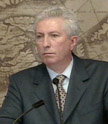 Meanwhile, yesterday’s big news still seems the biggest. Standing before an elegant and enlarged reproduction of an ancient map of “Canada or New France” (i.e. modern Quebec), in the capital city of modern Canada, Gilles Duceppe has now officially announced to the television cameras that he will not be running in the upcoming provincial Parti Qubcois leadership race.
Meanwhile, yesterday’s big news still seems the biggest. Standing before an elegant and enlarged reproduction of an ancient map of “Canada or New France” (i.e. modern Quebec), in the capital city of modern Canada, Gilles Duceppe has now officially announced to the television cameras that he will not be running in the upcoming provincial Parti Qubcois leadership race.
He will instead remain as leader of the federal Bloc Qubcois (the Ottawa-based branch of the Quebec sovereigntist movement), and lead the BQ in the next federal election, which he expects will come as soon as early next year, 2006.
The sheer complexity of the logistics involved in having two leadership races within the sovereigntist movement, followed almost immediately by a federal election, plays a big role in M. Duceppe’s declared explanation of his decision. This is without a doubt what would have to happen if M. Duceppe were to run for the PQ leadership. And it does seem a pretty good explanation as far as it goes.
Yet the most interesting thing about the decision just may be the door it also conceivably opens to a new and more constructive stage of the Quebec sovereignty debate. (And, among other things, mindless ranting against the “Unholy Alliance” of Stephen Harper’s Conservatives and Gilles Duceppe’s BQ may no longer be quite as useful to the Liberal Party of Canada as it has been in the past. Welcome to the 21st century, and all that.)
What is a sovereign country anyway?
 It would no doubt be wrong to press such thoughts very far at the moment. But even the report in the Globe and Mail notes that, in explaining his decision, Gilles Duceppe did say: “I have become convinced that I would be more useful here in Ottawa, not only to defend the interests of all Quebeckers, but also to contribute to the achievement of sovereignty … Because Ottawa and Quebec City are two equally important fronts in this goal of achieving sovereignty for Quebec and making Quebec a country.”
It would no doubt be wrong to press such thoughts very far at the moment. But even the report in the Globe and Mail notes that, in explaining his decision, Gilles Duceppe did say: “I have become convinced that I would be more useful here in Ottawa, not only to defend the interests of all Quebeckers, but also to contribute to the achievement of sovereignty … Because Ottawa and Quebec City are two equally important fronts in this goal of achieving sovereignty for Quebec and making Quebec a country.”
Even here, of course, Duceppe is talking about the Quebec of the future as what he also seemed to call, in English on television, a “sovereign country.” Yet again, just what does that mean? Might some Texans, e.g., say that Texas is a sovereign country in the USA? The California state flag, which flies all over the place, says that California is a Republic (and apparently 51% of the population of Los Angeles is now Spanish-speaking). An old Ontario textbook says that Ontario is already sovereign – within the limits set by the Constitution Act 1867. Alberta is already wild rose country. And Newfoundland was once its own British dominion. Nowadays all the provinces – and the three territories as well – have their own flags. (And what about Nunavut anyway? Isn’t that a bit like Quebec too? And then there’s Aboriginal Self-Government… .)
Remember the April Lger Marketing poll …
 In some similar vein, you can’t help but wonder whether Gilles Duceppe saw the same late April 2005 Lger Marketing poll that everyone else did. It showed support for “sovereignty” in Quebec as high as 54%. But the very bottom line was: “When asked if by voting for sovereignty they still wanted Quebec to continue to be a part of Canada, 56 per cent of respondents said yes and 40 per cent responded no, with 4 per cent undecided.” Which implies that, at best, less than 25% of the Canadian people of Quebec actually want to “separate” from Canada, even today.
In some similar vein, you can’t help but wonder whether Gilles Duceppe saw the same late April 2005 Lger Marketing poll that everyone else did. It showed support for “sovereignty” in Quebec as high as 54%. But the very bottom line was: “When asked if by voting for sovereignty they still wanted Quebec to continue to be a part of Canada, 56 per cent of respondents said yes and 40 per cent responded no, with 4 per cent undecided.” Which implies that, at best, less than 25% of the Canadian people of Quebec actually want to “separate” from Canada, even today.
(Which less than 25%, based on various accumulated polling evidence over the years, is arguably also about the same proportion as those in the rest of the country who would be just as happy to join the USA at last. Which is quite arguably what would finally happen if the less than 25% in Quebec who want real independence ever did get their way. And where would any of the Quebec or Canada projects be then? Meanwhile better than 75% in both Quebec and the rest of Canada want to carry on with building Canada. Why can’t we all just get along?)
Lvesque and Trudeau are yesterday’s persons …
 It is also true, as Richard Leroux stressed on CBC Newsworld not long after Gilles Duceppe made his announcement on Monday, June 13, that even the Ren Lvesque who believed in “sovereignty-association,” rather than “Quebec independence,” more strictly defined, had no use for the Bloc Quebecois. It was just something that Lucien Bouchard and his Mulroney Conservative Quebecois formed by accident, in the wake of the failure of the Meech Lake Accord in 1990. It had no serious role to play in the grand cause of Quebec aux Quebecois.
It is also true, as Richard Leroux stressed on CBC Newsworld not long after Gilles Duceppe made his announcement on Monday, June 13, that even the Ren Lvesque who believed in “sovereignty-association,” rather than “Quebec independence,” more strictly defined, had no use for the Bloc Quebecois. It was just something that Lucien Bouchard and his Mulroney Conservative Quebecois formed by accident, in the wake of the failure of the Meech Lake Accord in 1990. It had no serious role to play in the grand cause of Quebec aux Quebecois.
Yet once again, on the other hand, it is arguable enough that the most successful parts of Canadian political history have usually been the ones that just evolve by accident – out of the ebb and flow of life in the real-world democracy. Ren Lvesque’s more brilliantly conceived idea of sovereignty-association can’t claim to have worked in the end. And neither can Pierre Trudeau’s idea of federalism. (Although both have made deep enough contributions to the Canada of the past three or four decades.)
Desperately seeking something fresh and constructive ….
 Maybe somewhere in the depths of his “rigorous” mind Gilles Duceppe , now the longest-surviving federal political party leader in Ottawa, can see at least the dim outlines of some fresh and more realistic approach to the increasingly ancient problem of Canada and Quebec?
Maybe somewhere in the depths of his “rigorous” mind Gilles Duceppe , now the longest-surviving federal political party leader in Ottawa, can see at least the dim outlines of some fresh and more realistic approach to the increasingly ancient problem of Canada and Quebec?
And maybe there are even a few bold thinkers in the BQ’s Unholy Alliance partner of the Stephen Harper Conservatives – whose greatest claim on the national attention at the moment may just be their regional representation of at least a few key sides to Western Canada – who can see one or two related dim outlines? (And maybe in his heart of hearts Paul Martin can too, or even Jack Layton, who did grow up in Montreal.)
No doubt the most that can be said for such wild speculation right now is that there are at least a few reasons for thinking something fresh and constructively creative about the tired old story of Canada and Quebec may lie latent somewhere in Gilles Duceppe’s Monday, June 13, 2005 decision to remain in Ottawa.
In Parliament on the same day Prime Minister Martin welcomed the decision by noting that M. Duceppe had “chosen Canada,” and expressing the hope that he “will recommend the same choice to Quebecers.” Yet if Mr. Martin isn’t a bit careful about just what he does on this side of the picture over the next while, it seems not altogether impossible that these words just might explode in his face. At this point the current Canadian federal soap opera could start to get really interesting – and this time in all regions of the country.
The first people who called themselves Canadians …
 Of course, probably nothing like this is actually going to happen. It never does in Canada.
Of course, probably nothing like this is actually going to happen. It never does in Canada.
Except some of us can still remember that it has happened before. But this time the entertainment value for the cross-Canada electorate does seem potentially greater. There is a little more suitably sardonic humour in the air.
And remember: one thing the great Quebec sovereignty debate does seem to have shown so far, since 1968, is that when push comes to shove, many Quebec sovereigntists also do suddenly remember that Quebecers were, in plain historical fact, the first people who called themselves Canadians. The polls even today still do suggest that most of them don’t really want to give all that up either. And the more independent you really are, the less of a role you will play in shaping the wider Canadian future – as the Bloc Quebecois is continuing to do right now.
Does even the new sovereign Quebec (which is, as even Karla Homolka has been able to deduce, already pretty much on the ground, with its own distinctive National Assembly and all that), really want to send no Members of Parliament to Ottawa at all? Is that what we are going to see in the next federal election?
JUNE 11-12: IS GILLES DUCEPPE THINKING ABOUT MISTAKES TRUDEAU MADE TOO?
 According to the cyberspace statistics, the top search keyphrase bringing new visitors to counterweights over the first third of June 2005 has been “mistakes trudeau made.”
According to the cyberspace statistics, the top search keyphrase bringing new visitors to counterweights over the first third of June 2005 has been “mistakes trudeau made.”
After a heated meeting in the one office with an air conditioner, the counterweights editors have resolved to address the subject head on. And the weekend when Bloc Quebecois leader Gilles Duceppe is supposed to be deciding “whether he will move from federal to provincial politics and run for the leadership of the Parti Qubcois” seems the right time to do it.
M. Duceppe is scheduled to announce his decision this Monday, June 13, and apparently in Ottawa. The rather sudden need for his deep thought this weekend flows from Bernard Landry’s decision last weekend to resign as leader of the provincial Parti Qubcois, and unofficial commander in chief of the Quebec sovereigntist movement writ large. (If you are a sovereigntist, after all, Quebec City and not Ottawa is where you must finally want to be. Or is it? Read on.)
On this weekend as well members of the PQ executive will be deciding just when the contest to succeed M. Landry as party leader will take place. Meanwhile Louise Harel has been selected as interim leader of the PQ caucus in the Quebec National Assembly – in what is for the moment at least said to be “a party ruled by women.” (Not too unlike the provincial New Democrats in BC?)
Mistakes Trudeau made …
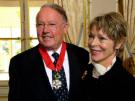 Gilles Duceppe himself has already confessed that he was “shocked” by M. Landry’s decision to resign as PQ leader (and for more on this see much further below). It surprised everyone else too. In the increasingly long list of recent surprises in Canadian federal politics, it ranks even higher than Belinda Stronach’s bolt from the Conservatives to the Liberals.
Gilles Duceppe himself has already confessed that he was “shocked” by M. Landry’s decision to resign as PQ leader (and for more on this see much further below). It surprised everyone else too. In the increasingly long list of recent surprises in Canadian federal politics, it ranks even higher than Belinda Stronach’s bolt from the Conservatives to the Liberals.
It probably also ranks higher than the latest big surprise, from the Supreme Court of Canada – which has decided by a 43 vote to legalize private health insurance in Quebec, under the Quebec provincial version of Pierre Trudeau’s Canadian Charter of Rights and Freedoms. But this does in any case get us back to the mistakes Trudeau made, during his long tenure as prime minister of Canada from 1968 to 1984 (with several months’ vacation in 19791980).
Just to review the deepest background quickly, two pretty great political rivals emerged from the trendy turmoil of the 1960s in Quebec. Ren Lvesque believed in “sovereignty-association” between Quebec and the rest of Canada, and became the first leader of the Parti Qubcois in 1968. Pierre Trudeau believed in Federalism and the French Canadians, and became leader of the Liberal Party of Canada and Prime Minister of Canada in 1968.
From 1968 to 1984 Trudeau and Lvesque fought each other on many fronts. On the surface of things Trudeau – the rich French-and-English kid from Montreal who never worked a day in his life until he became prime minister, as some enemies said – won almost all the key pitched battles in the short term. But somewhere below the surface Lvesque – at least more of a very bright guy from the francophone back country – left his own powerful legacy. And, say whatever else you like, this legacy does seem considerably stronger and more enduring than Trudeau’s, inside Quebec itself today. Lvesque’s followers may or may not be in some disarray at the moment. But Trudeau’s barely exist (certainly in Quebec – and even the rest of Canada too?).
 So, we don’t have a lot of time. Just what were the key mistakes Trudeau made? We’ll confine ourselves to just two of the biggest ones, because we don’t have a lot of time:
So, we don’t have a lot of time. Just what were the key mistakes Trudeau made? We’ll confine ourselves to just two of the biggest ones, because we don’t have a lot of time:
1. TOO MUCH OF A MONTREAL NATIVE. Trudeau’s first big mistake was captured brilliantly long ago by the Ontario historian Robert Bothwell, in a saying that runs something like: “Pierre Trudeau saw Canada from one end of Montreal Island to the other.” I.e., deep down Trudeau was a passionate native son of Montreal, who had traveled widely in the global village, while the rest of us had to work for a living. He understood neither the majority of the Canadian anglophone population outside Montreal, nor the majority of the Quebec francophone population outside Montreal. His solution to almost all problems in all such places was that the people there should just become more like the people in Montreal.
2. TOO MUCH OF A MONTREAL NATIVE. Trudeau’s second big mistake (which may also have been quite a lot like the first one) was captured brilliantly by a now forgotten grey eminence from Quebec, during one of the interminable Canadian TV shows about the Meech Lake Accord in the late 1980s. On this view, Trudeau’s United Canada policies concentrated too much on protecting the rights of minorities – the English-speaking minority in Quebec, and the French-speaking minority in the rest of Canada. There needed to be parallel policies to look after the French-speaking majority in Quebec, and the English-speaking majority in the rest of Canada. (And again Trudeau’s own answer to this kind of argument was almost always that everyone should just try harder to be more like the people in Montreal – well, Outremont anyway.)
Just before leaving this grave catalogue of error, it is probably worth touching as well on Pierre Trudeau’s enormous and undoubted achievement – that still leaves him as one of the very few giants in Canadian political history, regardless of his many mistakes. In the wake of the first Quebec sovereignty referendum in 1980, which Ren Lvesque lost, Trudeau managed to “patriate” the Canadian constitution from the United Kingdom at last, along with a new Canadian Charter of Rights and Freedoms, in the Constitution Act 1982. Canadian politicians had been trying to do this since the late 1920s, without success. But it was Trudeau who did it in the end, even if with the official approval of only nine of the 10 provinces of Canada. (Quebec, of which Ren Lvesque was still premier at the time, understandably demurred.) As the legendary pioneer of Canadian public health care Tommy Douglas said on TV, as such things go in Canada it was a great achievement, and probably only Pierre Trudeau could have brought it off.
What Trudeau’s mistakes may or may not mean for Gilles Duceppe today
 Meanwhile back in the late spring of 2005 (which seems a lot like summer in some parts of Canada, and is apparently full of water in others), Gilles Duceppe is trying to figure out whether he should resign as leader of the federal Bloc Qubcois, so he can run for leader of the provincial Parti Qubcois.
Meanwhile back in the late spring of 2005 (which seems a lot like summer in some parts of Canada, and is apparently full of water in others), Gilles Duceppe is trying to figure out whether he should resign as leader of the federal Bloc Qubcois, so he can run for leader of the provincial Parti Qubcois.
Until quite recently, the favoured opinion among well plugged-in Ottawa journalists seemed to be that M. Duceppe is bound to run in the PQ leadership race. In the world of the Quebec sovereigntist movement it is the more senior and better job, right? Thanks in part to the sponsorship scandal and the Gomery testimony in Montreal, Gilles Duceppe may be the most attractive leader the Quebec sovereigntist movement has at the moment. How can he finally resist reaching for the top?
Yet on the afternoon of Friday, June 10 CTV News announced that: “Though he’s waiting until Monday to make an annoucement, there are hints Bloc Quebecois leader Gilles Duceppe won’t be leaving federal politics to run for leadership of the Parti Quebecois … Duceppe had been put forth as a possible candidate when Bernard Landry resigned last weekend. Polls showed he would be the front-runner in a race for the provincial party’s leadership … But CTV’s Rosemary Thompson says that since Duceppe is making his announcement in Ottawa, that’s likely where he’ll stay. Symbolically, if he made a run for Quebec politics, he’d do it in Montreal,’ Thompson said.”
Ms. Thompson goes on: “Duceppe has been consulting prominent members of the separatist movement including former PQ leaders Lucien Bouchard, Jacques Parizeau and Landry. They’re trying to find the best place for Duceppe to play a role in the sovereignty movement. If he was to leave now, he would weaken the Bloc because there is no natural successor in the party,’ Thompson said. That is why many of his colleagues think he will stay.'”
 We will apparently learn the truth about all such speculation soon enough, on Monday, June 13. Meanwhile, whatever Gilles Duceppe finally decides, the notion that his decision will not be some kind of slam-dunk no-brainer to leave Ottawa and run for the allegedly better job in Quebec City may be a bit interesting.
We will apparently learn the truth about all such speculation soon enough, on Monday, June 13. Meanwhile, whatever Gilles Duceppe finally decides, the notion that his decision will not be some kind of slam-dunk no-brainer to leave Ottawa and run for the allegedly better job in Quebec City may be a bit interesting.
Back in the old days, Trudeau’s essential critique of the PQ goal of “sovereignty-association” between Quebec and the rest of Canada was that the rest of Canada was not remotely interested in being the kind of partner to Quebec that the concept entailed. It warmed instead to Trudeau’s own “federalist” concept of one united French and English Canada, from coast to coast to coast. But the big problem with Trudeau’s own concept was that the rest of Canada was not really prepared (or even able) to turn itself into a replica of Montreal Island, as would be required if a person from Quebec who spoke only French were to be comfortable in all parts of the country.
In any event, time is running out again. The interesting point, conceivably, is that if you mix all this history up for the changing circumstances of today the job of federal Bloc Quebecois leader in Ottawa may be a more important one for the real long-term goal of the Quebec sovereigntist movement than used to be imagined.
If the sovereigntist-movement majority’s real long-term goal, that is to say, still is Ren Lvesque’s sovereignty-association – and not some sort of ultimate Quebec “independence” (as at least some strong enough factions in the PQ still do seem to be hoping for, no doubt) – then the kind of terrain Gilles Duceppe has been exploring in his federal parliamentary alliance with Stephen Harper’s Conservatives in Ottawa, over the past few months now, could just be almost as important for the real long-term future as anything that happens in Quebec City.
 Maybe, maybe not, of course. M. Duceppe may still tell us on Monday that he is going to run for the PQ leadership after all, because that is after all still the most important job for the Quebec sovereigntist movement writ large. And a third Quebec sovereignty referendum, that just could be won at last, thanks to the sponsorship scandal, may still be the next challenge that Pierre Trudeau’s old concept of a United Canada will alas have to face all over again, and soon enough. (Even if the question is not really about “independence,” any more than it was in the first two? Or will Jean Chretien’s Clarity Act actually protect us from that this time?)
Maybe, maybe not, of course. M. Duceppe may still tell us on Monday that he is going to run for the PQ leadership after all, because that is after all still the most important job for the Quebec sovereigntist movement writ large. And a third Quebec sovereignty referendum, that just could be won at last, thanks to the sponsorship scandal, may still be the next challenge that Pierre Trudeau’s old concept of a United Canada will alas have to face all over again, and soon enough. (Even if the question is not really about “independence,” any more than it was in the first two? Or will Jean Chretien’s Clarity Act actually protect us from that this time?)
Yet both Ren Lvesque and Pierre Trudeau are with us no longer. And it actually could be that their earlier stark antagonisms between “sovereignty” and “federalism” in Quebec have already begun to dissolve into something a bit new and different – and perhaps a bit more optimistic – for the early 21st century.
Gilles Duceppe has arguably been winning some respect in English-speaking Canada that didn’t used to be there – and out West as well as back East. It could just be that he will serve the interests of Quebec best by staying in Ottawa, for the time being at least. And maybe there are a few more big enough surprises ahead?
(Or again, maybe not, of course. But wouldn’t it be still more interesting if there were? And as of late Saturday, June 11, with the PQ executive having decided that a new PQ leader will be officially named this coming mid-November, it apparently now does seem even more likely that Gilles Duceppe will be telling us he’ll stay in Ottawa, in Ottawa on Monday.)
JUNE 9-10: HOW IS CANADIAN TV JOURNALISM DOING … as the political plot thickens in Ottawa?
 The hour-long CBC National news for the evening of Tuesday, June 7, 2005 took that fragment of the English-speaking Canadian television audience actually watching on a strange journey.
The hour-long CBC National news for the evening of Tuesday, June 7, 2005 took that fragment of the English-speaking Canadian television audience actually watching on a strange journey.
At the end you were left with a somewhat puzzled and uncertain mood in the anglophone majority branch of Canada’s national public broadcaster, at this exact moment in the continuing sordid soap opera of current Canadian federal politics.
 (Which now probably will only come to a definitive end with a fresh federal election, 10 months hence at the latest? And at this juncture who can resist the thought that an election even sooner could also be a good thing – especially if you are a Liberal looking at the most recent polls?)
(Which now probably will only come to a definitive end with a fresh federal election, 10 months hence at the latest? And at this juncture who can resist the thought that an election even sooner could also be a good thing – especially if you are a Liberal looking at the most recent polls?)
On the evening of Wednesday, May 8 the mood on Mike Duffy’s new hour-long nightly report on the ongoing saga of The Days of Our Parliament, on CTV Newsnet, was a bit different. Amidst some but not infinite good humour, there are still starkly opposed perceptions of just what is going on in the nation’s capital – as well as opposing MPs who apparently do get along. Yet in the end Mike Duffy left you feeling somewhat puzzled and uncertain too.
The strange journey at the CBC …
 The CBC National news for Tuesday, June 7 began with a few stories that had nothing at all to do with the ongoing antics in Ottawa. At first the big political message seemed to be that it was time to lay back a bit. As if it was already the middle of the summer, free from all deep thought about anything but the sun and the moon and the stars at night.
The CBC National news for Tuesday, June 7 began with a few stories that had nothing at all to do with the ongoing antics in Ottawa. At first the big political message seemed to be that it was time to lay back a bit. As if it was already the middle of the summer, free from all deep thought about anything but the sun and the moon and the stars at night.
Further into the broadcast, however, Peter Mansbridge slyly introduced the latest on Conservative MP Gurmant Grewal. Assorted colleagues of Mr. Grewal in his own greater Vancouver South Asian community told the cameras that he was an embarrassment and a spent political force. Whatever else, it didn’t look good for Stephen Harper and his party. And the national soap opera was back at the centre of the local universe.
Then there was an attempt to sum up the salacious details of the now completed Gomery inquiry testimony. It included allusions to the mob movie Goodfellas, and clips from assorted sordid and not-so-sordid lead actors in the Quebec sponsorship scandal – including a Liberal-friendly Toronto advertising executive, who had the bad manners (and/or good fortune) to obtain Quebec sponsorship money for a promotional movie about Canada that was only ever shown in China.
 You could say that all this didn’t look good for Paul Martin and his party, and this would no doubt be somewhat true. Yet dwelling on, e.g., the $6000 of sponsorship money that the minister in charge, Alphonse Gagliano, took to pay for a public memorial used at an official ceremony he attended in Italy, could also have stiffened popular perceptions that the scandal itself may have a lot of explosive smoke, but not necessarily a great deal of truly appalling fire.
You could say that all this didn’t look good for Paul Martin and his party, and this would no doubt be somewhat true. Yet dwelling on, e.g., the $6000 of sponsorship money that the minister in charge, Alphonse Gagliano, took to pay for a public memorial used at an official ceremony he attended in Italy, could also have stiffened popular perceptions that the scandal itself may have a lot of explosive smoke, but not necessarily a great deal of truly appalling fire.
This may help explain why the latest opinion poll, from Decima Research, shows that the “Liberals have a 14-point lead over the Conservatives in popular support” across Canada, despite all the sordid Gomery testimony of the past several weeks.
(Meanwhile, for another early attempt to sum up just what the Gomery inquiry has finally told us about the real world of Canadian politics today, check out the recent short piece by L. Ian MacDonald from Montreal, in the June 2005 issue of Policy Options. It interestingly enough concludes that “Ironically, the explosive nature of the Gomery revelations is the most persuasive evidence that Martin, as he claimed all along, was not involved in the sponsorship program. No politician in his right mind, if he had been involved, would have appointed a commission of inquiry to, as Martin has said, get to the bottom of it.'”)
And then there’s Mike Duffy’s new show on CTV
 The well-dressed and cherubic Mike Duffy’s new nightly show on CTV Newsnet has a certain freshness. For the moment it also seems to be picking up on more of the sense of actual popular enjoyment of the ongoing national political soap opera than the CBC. (It is as well, in theory at least, somewhat better disposed towards the Conservative as opposed to the Liberal cause, whatever that exactly may mean nowadays.)
The well-dressed and cherubic Mike Duffy’s new nightly show on CTV Newsnet has a certain freshness. For the moment it also seems to be picking up on more of the sense of actual popular enjoyment of the ongoing national political soap opera than the CBC. (It is as well, in theory at least, somewhat better disposed towards the Conservative as opposed to the Liberal cause, whatever that exactly may mean nowadays.)
It is both a strength and a weakness of Mike Duffy’s show that it tries to plug very directly into the inside Ottawa gossip networks. This does seem to work in, e.g., Globe and Mail reporter Jane Taber’s restaurant gathering of the parliamentary transport committee, still trying to transact some serious public business, in the midst of all the more ephemeral political theatre.
It seems less successful when it lures the program into dwelling on Ottawa insider obsessions that don’t appear to have much resonance with the wider sovereign electorate. Another recent Decima research poll, e.g., on the popular impact of the Grewal tapes saga, has suggested that the “public appears to have doubts about the credibility of the allegations and doubts about whether the country’s political agenda should be focused on this matter.”
 Yet like the CBC National news on June 7, Mike Duffy’s CTV show on June 8 nonetheless dug into the continuing insider obsession with the Grewal tapes quite passionately. There are those in Ottawa out to bring down Prime Minister Martin’s chief of staff Tim Murphy, for alleged ethical improprieties in his role in the Grewal affair.
Yet like the CBC National news on June 7, Mike Duffy’s CTV show on June 8 nonetheless dug into the continuing insider obsession with the Grewal tapes quite passionately. There are those in Ottawa out to bring down Prime Minister Martin’s chief of staff Tim Murphy, for alleged ethical improprieties in his role in the Grewal affair.
As former Brian Mulroney staffer Norman Spector explained to Mike Duffy and friends on June 8, to understand just what it is that Tim Murphy may have done wrong, you have to draw some rather subtle distinctions between negotiating about prospects of ordinary political promotion, to the cabinet and so forth, and negotiating about such non-political government jobs as ambassadorships, or cushy Canadian-related sinecures at the UN in New York.
It is not too hard to see why many ordinary voters’ eyes just glaze over, when confronted by technico-ethico political talk of this sort. And it remains hard not to suspect as well that the great unwashed voting public may be on much firmer ground, with its “doubts about whether the country’s political agenda should be focused on this matter.”
 Meanwhile, neither CBC on June 7 nor CTV on June 8 wanted to get anywhere near the potential seismic shift in the Canadian political landscape prompted by Bernard Landry’s resignation as leader of the Parti Quebecois in Quebec provincial politics, this past June 4-5 weekend. If the current Ottawa soap opera induced by the Gomery inquiry is going to finally turn into some more tough-minded and constructive confrontation with at least some of Canada’s deeper and more significant ongoing political problems, it probably won’t be television that will lead the way.
Meanwhile, neither CBC on June 7 nor CTV on June 8 wanted to get anywhere near the potential seismic shift in the Canadian political landscape prompted by Bernard Landry’s resignation as leader of the Parti Quebecois in Quebec provincial politics, this past June 4-5 weekend. If the current Ottawa soap opera induced by the Gomery inquiry is going to finally turn into some more tough-minded and constructive confrontation with at least some of Canada’s deeper and more significant ongoing political problems, it probably won’t be television that will lead the way.
 You could see such things between the lines, on both networks on both days – and over east-west regional tensions in the rest of Canada, as well tensions between Canada and Quebec. But Canadian television still seems somewhat too puzzled and uncertain about just what is going on in Ottawa at the moment. It remains mostly concerned to capture the entertainment value of the current national soap opera as best it can.
You could see such things between the lines, on both networks on both days – and over east-west regional tensions in the rest of Canada, as well tensions between Canada and Quebec. But Canadian television still seems somewhat too puzzled and uncertain about just what is going on in Ottawa at the moment. It remains mostly concerned to capture the entertainment value of the current national soap opera as best it can.
It is arguably having at least some success at that. Who knows? This just may hold out its own optimistic promise for the near enough future too. And in any case another long, hot summer, full of all sorts of exotic thoughts beneath the northern lights, does remain in view.
JUNE 7-8: CANADIAN POLITICAL PLOT THICKENS … Landry steps down in Quebec … (and O’Brien is out in Ottawa)
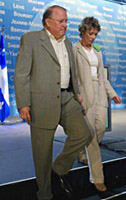 Move over Belinda. Bernard Landry, the now former leader of the Parti Quebecois in Quebec provincial politics, has just come up with a bigger surprise for Canadian federal politics.
Move over Belinda. Bernard Landry, the now former leader of the Parti Quebecois in Quebec provincial politics, has just come up with a bigger surprise for Canadian federal politics.
And the other, francophone side of the Conservative-Bloc Quebecois alliance that almost managed to bring the government down on May 19 has the spotlight in Ottawa, for the moment at least.
Meanwhile, Liberal MP Pat O’Brien has told Prime Minister Paul Martin that he will henceforth sit as an Independent. Mr. O’Brien is protesting Mr. Martin’s tepid implementation of an earlier promise to allow full public consultation on the government’s gay marriage Bill C-38.
Mr. O’Brien is apparently not necessarily concerned to do anything as rash as bring the government down on this issue. But even so, as they say, for the Martin Liberals the optics are not good.
Bernard’s Bolt and the resurgent Quebec sovereignty issue on the horizon
M. Landry’s decision to step down as PQ leader, after he won only 76.2% of a leadership confidence vote at party convention over the June 45 weekend, apparently surprised even his closest associates. (As Rhal Sguin has reported in the Globe and Mail, “Just moments before making his announcement to party delegates, Mr. Landry gathered a dozen or so of his most loyal supporters and told them one by one he was leaving.”)
Going into the convention, M. Landry had apparently already believed that an “80-per-cent approval rating … was needed to eliminate any challenge to his leadership.” So for those who knew about that, his decision to resign when he fell short of this goal ought not to have been too surprising.
But given everything else that has been going in on Canadian politics lately, it was also rather refreshing. Bernard Landry is not a politician who believes that the most important political objective in the universe is the advancement of his own political career.
 He courageously and perhaps wisely decided that the most constructive thing he could do at the present juncture in the wider history of Canadian politics was to resign his leadership of the original Quebec sovereigntist party, founded by Ren Lvesque and others back in 1968 (the same year that Pierre Trudeau became prime minister of Canada).
He courageously and perhaps wisely decided that the most constructive thing he could do at the present juncture in the wider history of Canadian politics was to resign his leadership of the original Quebec sovereigntist party, founded by Ren Lvesque and others back in 1968 (the same year that Pierre Trudeau became prime minister of Canada).
In any case, Bernard’s Bolt from the Parti Quebecois still plays directly enough into what some have seen as the ultimate horror-show scenario about the sordid Gomery inquiry and the always fragile politics of Canada and Quebec. It sets in motion a new PQ leadership race, which the current federal Bloc Quebecois leader Gilles Duceppe could win – followed by a third sovereignty referendum (which the sovereigntists might win at last, on the tide of the especially deep anger with the Gomery testimony inside Quebec).
However likely this particular scenario may or may not prove to be, M. Landry’s decision may well prompt largely unanticipated leadership races in both the Parti and the Bloc Quebecois. And this, as federal transport minister (and “Paul Martin’s Quebec lieutenant”) Jean Lapierre said on Sunday, June 5, “changes the whole political dynamic in the coming months.”
 In the shortest term Mr. Lapierre and other like minds apparently feel that the changes involved could “relieve some of the pressure on the minority Liberal government.” Whatever the truth may finally prove to be here, the return of serious soul-searching on the future of Canada and Quebec and all that – which at least ought to be one aspect of the new internal turmoil inside the Quebec sovereigntist movement (and outside too) – could also bring a few much-needed more constructive impulses to the wider gathering storm in Ottawa.
In the shortest term Mr. Lapierre and other like minds apparently feel that the changes involved could “relieve some of the pressure on the minority Liberal government.” Whatever the truth may finally prove to be here, the return of serious soul-searching on the future of Canada and Quebec and all that – which at least ought to be one aspect of the new internal turmoil inside the Quebec sovereigntist movement (and outside too) – could also bring a few much-needed more constructive impulses to the wider gathering storm in Ottawa.
Somewhere in the Canadian history of the 37-odd years that has elapsed since the always interesting Ren Lvesque became the Parti Quebecois’s first leader in 1968 lurks a more sensible and more durable approach to Quebec’s changing role in the changing confederation than the people of Canada have as yet seen laid before them.
It may still be a little too much to hope that some approach of this sort will at least dimly show its face in the debates that accompany Jean Lapierre’s changes in the whole political dynamic in the coming months. But it may nonetheless be equally worth trying to keep something of the hope alive. And it may be an opportunity as well for both non-Liberal and largely anglophone federal political parties in Canada to show that the old stories about how only the Liberals know how to govern the true north strong and free are showing their age.
 Meanwhile, as we wait and watch and listen, we voters in the rest of Canada might no doubt bear a few constructive things in mind too. We could, e.g., remind ourselves that Ren Lvesque’s original plot was not called Quebec independence but “sovereignty association” – and that some version of this concept (and not “independence”) was in fact what was proposed in both the 1980 and 1995 Quebec sovereignty referendums.
Meanwhile, as we wait and watch and listen, we voters in the rest of Canada might no doubt bear a few constructive things in mind too. We could, e.g., remind ourselves that Ren Lvesque’s original plot was not called Quebec independence but “sovereignty association” – and that some version of this concept (and not “independence”) was in fact what was proposed in both the 1980 and 1995 Quebec sovereignty referendums.
We could think too about how all Canadian provinces are already sovereign. (Or as explained in an early 20th century text on Canada’s most populous province, “Within the limitations prescribed by” what is now called the Constitution Act 1867 “the Province of Ontario is a sovereign state.”) Or about how, while this applies to Quebec as to Ontario, British Columbia, Alberta, Newfoundland, and everyone else, it is also a simple statement of observable empirical fact that “Quebec is not a province like the others” – because it really does still have a French-speaking and not an English-speaking majority in its population.
 Of course even from the beginnings of such wisdom who knows what may or may not follow in the very end? But after 37-odd years of debating the big issue of Canada and Quebec in almost every foolishly theatrical and essentially false and unrealistic way possible, the law of averages ought to be saying that something fresh and much more sensible is lurking somewhere in the shadows of midnight on the Ottawa River – as it branches off from the historic great River of Canada that will always run through Quebec. (Something to think a bit about at the cottage up north this summer, or wherever else in the global village we may be.)
Of course even from the beginnings of such wisdom who knows what may or may not follow in the very end? But after 37-odd years of debating the big issue of Canada and Quebec in almost every foolishly theatrical and essentially false and unrealistic way possible, the law of averages ought to be saying that something fresh and much more sensible is lurking somewhere in the shadows of midnight on the Ottawa River – as it branches off from the historic great River of Canada that will always run through Quebec. (Something to think a bit about at the cottage up north this summer, or wherever else in the global village we may be.)
Meanwhile back at the Grewal tapes … and Pat O’Brien on Bill C-38
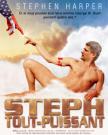 Nothing perhaps shows just how much the gathering storm in the Parliament of Canada needs the kind of fresh jolt of more constructive reality that Bernard Landry’s resignation as PQ leader just might provide as the latest story about just how many angels there actually are on the head of Gurmant Grewal’s tape recorder.
Nothing perhaps shows just how much the gathering storm in the Parliament of Canada needs the kind of fresh jolt of more constructive reality that Bernard Landry’s resignation as PQ leader just might provide as the latest story about just how many angels there actually are on the head of Gurmant Grewal’s tape recorder.
On retainer from the Globe and Mail, “Jack Mitchell, a U.S. forensic audio expert who conducted a preliminary review of portions of the originally released recordings, said” that Mr. Grewal’s tapes of his meetings with Liberal emissarries prior to the May 19 vote “had been altered … These tapes have been edited. This is not a maybe. This is not something that’s unexplained … This is a definitive statement. The tapes have been edited,’ Mr. Mitchell said … He said he could not say with certainty how the alterations occurred, or conclude definitely that it was done intentionally.”
The main questions here still seem to be So What? and Who Cares? Chuck Cadman gave the ultimate folk wisdom about the Grewal tapes on TV, when they first appeared. One way or another, they show just the kind of thing you might expect would happen in politics, just before a big event like the May 19 vote. And how much more is worth saying, beyond that simple truth?
(It sometimes seems that Stephen Harper and some of his associates in the new Conservative Party of Canada actually may have some interesting secret thoughts about the future of Canada and Quebec, that Bernard Landry’s resignation as PQ leader has just cast fresh light on. Maybe if they, and even the New Democrats too, started talking to Canadians sensibly about something like that, they could start to show that they do have what it takes to govern Canada at last?)
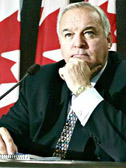 Meanwhile yet again, from his observation of the past several weeks in Canadian federal politics Pat O’Brien, former Liberal MP for the Southwestern Ontario riding of LondonFanshawe, has concluded that in his fight against the Martin government’s Bill C-38, on same-sex marriage, he just may “be more successful as an independent than I was as a Liberal.”
Meanwhile yet again, from his observation of the past several weeks in Canadian federal politics Pat O’Brien, former Liberal MP for the Southwestern Ontario riding of LondonFanshawe, has concluded that in his fight against the Martin government’s Bill C-38, on same-sex marriage, he just may “be more successful as an independent than I was as a Liberal.”
However successful he may or may not be in the end, it is arguable enough that his decision is another optimistic sign in the current gathering storm in Canadian federal politics. In leaving Mr. Martin’s party as he has, for the moment at least, Mr. O’Brien just might be helping to show that there is still some hope yet for Mr. Martin’s rhetorical assault on the democratic deficit.

